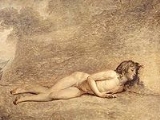
Joseph Bara
Encyclopedia
Joseph Bara, also written Barra (30 July 1779, Palaiseau
– 7 December 1793 Jallais
) a young French
republican soldier at the time of the Revolution
.
He was in fact too young to join the army but attached himself to a unit fighting counter revolutionaries
in Vendée
. After his death General J.-B. Desmarres gave this account, by letter, to the Convention. "Yesterday this courageous youth, surrounded by brigands, chose to perish rather than give them the two horses he was leading."
The boy's death was seized on as a propaganda
opportunity by Robespierre, who praised him at the Convention's tribune saying that "only the French have thirteen-year-old heroes". But rather than simply being killed by Breton royalists
who solely wanted to steal horses, Bara was transformed into a figure who denied the Ancien Régime
at the cost of death. His story became that having been trapped by the enemy and being ordered to cry "Vive le Roi" ("Long live the King") to save his own life, he preferred instead to die crying "Vive la République" ("Long live the Republic").
His remains were transferred to the Panthéon
during a revolutionary festival in his honor.
Palaiseau
Palaiseau is a commune in the southern suburbs of Paris, France. It is located from the center of Paris. Palaiseau is a sub-prefecture of the Essonne department and the seat of the Arrondissement of Palaiseau....
– 7 December 1793 Jallais
Jallais
Jallais is a commune in the Maine-et-Loire department in western France....
) a young French
France
The French Republic , The French Republic , The French Republic , (commonly known as France , is a unitary semi-presidential republic in Western Europe with several overseas territories and islands located on other continents and in the Indian, Pacific, and Atlantic oceans. Metropolitan France...
republican soldier at the time of the Revolution
French Revolution
The French Revolution , sometimes distinguished as the 'Great French Revolution' , was a period of radical social and political upheaval in France and Europe. The absolute monarchy that had ruled France for centuries collapsed in three years...
.
He was in fact too young to join the army but attached himself to a unit fighting counter revolutionaries
Revolt in the Vendée
The War in the Vendée was a Royalist rebellion and counterrevolution in the Vendée region of France during the French Revolution. The Vendée is a coastal region, located immediately south of the Loire River in western France. The uprising was closely tied to the Chouannerie, which took place in...
in Vendée
Vendée
The Vendée is a department in the Pays-de-la-Loire region in west central France, on the Atlantic Ocean. The name Vendée is taken from the Vendée river which runs through the south-eastern part of the department.-History:...
. After his death General J.-B. Desmarres gave this account, by letter, to the Convention. "Yesterday this courageous youth, surrounded by brigands, chose to perish rather than give them the two horses he was leading."
The boy's death was seized on as a propaganda
Propaganda
Propaganda is a form of communication that is aimed at influencing the attitude of a community toward some cause or position so as to benefit oneself or one's group....
opportunity by Robespierre, who praised him at the Convention's tribune saying that "only the French have thirteen-year-old heroes". But rather than simply being killed by Breton royalists
Chouan
Chouan is a French surname. It was used as a nom de guerre by the Chouan brothers, most notably Jean Cottereau, better known as Jean Chouan, who led a major revolt in Bas-Maine against the French Revolution...
who solely wanted to steal horses, Bara was transformed into a figure who denied the Ancien Régime
Ancien Régime in France
The Ancien Régime refers primarily to the aristocratic, social and political system established in France from the 15th century to the 18th century under the late Valois and Bourbon dynasties...
at the cost of death. His story became that having been trapped by the enemy and being ordered to cry "Vive le Roi" ("Long live the King") to save his own life, he preferred instead to die crying "Vive la République" ("Long live the Republic").
His remains were transferred to the Panthéon
Pantheon
-Mythology:* Pantheon , the set of gods belonging to a particular mythology* Pantheon * Pantheon, Rome, now a Catholic church, once a temple to the gods of ancient Rome* Any temple dedicated to an entire pantheon-Other buildings:...
during a revolutionary festival in his honor.
Honours
- A 1794 painting by Jacques-Louis DavidJacques-Louis DavidJacques-Louis David was an influential French painter in the Neoclassical style, considered to be the preeminent painter of the era...
depicts the dying Bara. - A 1880 painting (La Mort de Bara) by Jean Joseph Weerts also depicts Bara's death.
- A painting (La Mort de Bara) by Charles Moreau-Vauthier depicts Bara as a dead drummer boyDrummer boy (military)Drummer boys were children recruited as military drummers for use on the battlefield.Armies regularly recruited young boys for this service, well into the nineteenth century...
. - A street in the 6th arrondissement of Paris is named after him.
- Bara is alluded to in the Chant du départChant du départThe Chant du Départ is a revolutionary and war song written by Étienne Nicolas Méhul and Marie-Joseph Chénier in 1794. It was the official anthem of the First Empire....
- A ship of the lineShip of the lineA ship of the line was a type of naval warship constructed from the 17th through the mid-19th century to take part in the naval tactic known as the line of battle, in which two columns of opposing warships would manoeuvre to bring the greatest weight of broadside guns to bear...
was named Barra in his honour

